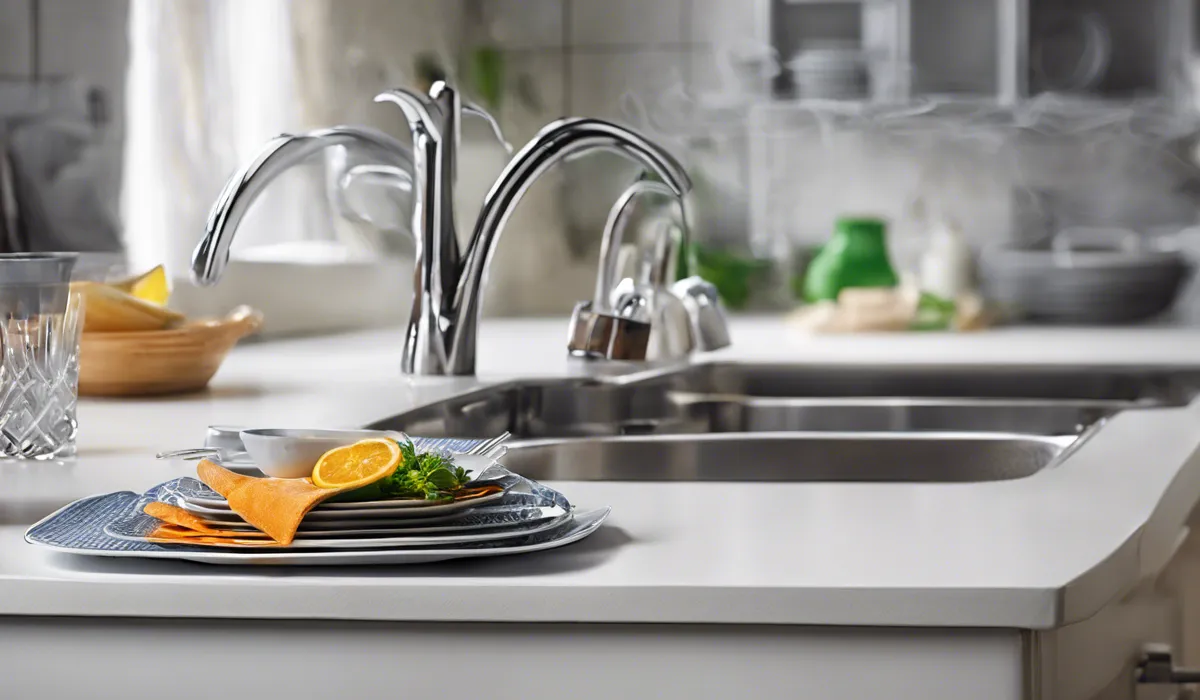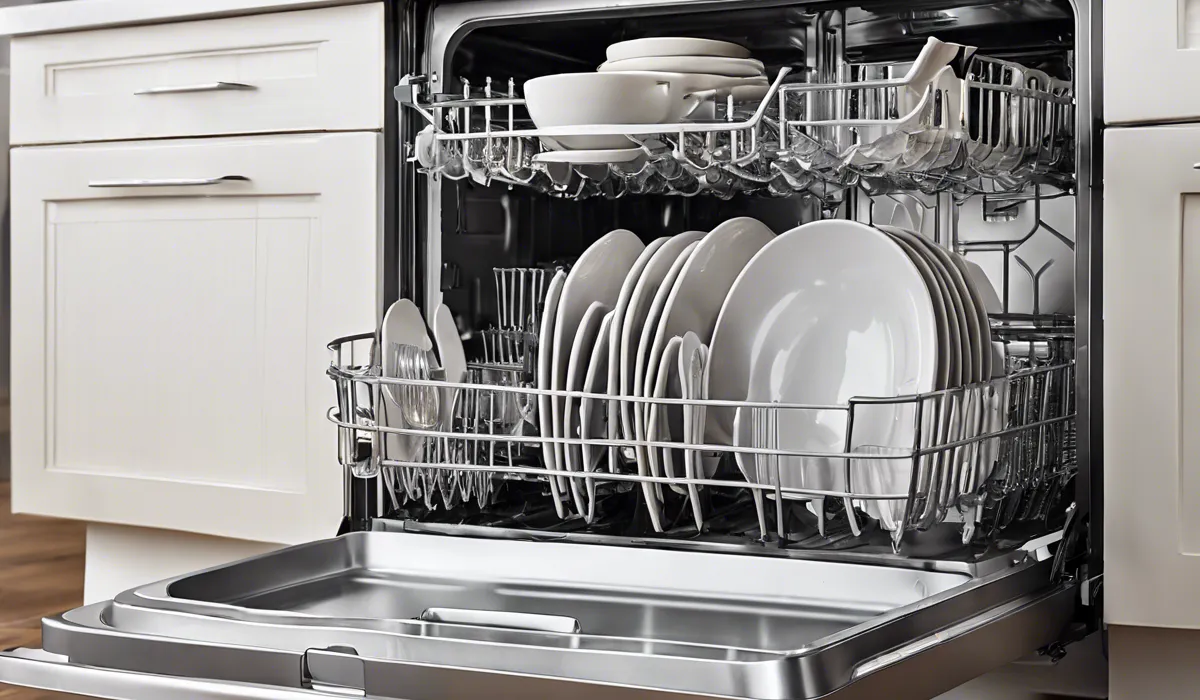Why Do My Dishes Smell After Dishwasher? End Odors Now!
Dishes smell after using a dishwasher due to trapped food particles, mold, or bacteria growth in the machine’s filters or hidden crevices. Regularly cleaning the dishwasher, including the filter, spray arms, and door gasket, can prevent odors and maintain cleanliness.
Common Causes of Smelly Dishes After Dishwasher Use

Trapped Food Particles and Grease
One of the most common reasons for smelly dishes is the presence of trapped food particles and grease.
Over time, these can accumulate in the filter, drain hose, and other nooks and crannies of your dishwasher, creating an ideal environment for bacteria to thrive.
These bacteria are often responsible for the unpleasant odors you’re experiencing. To avoid this issue, it’s crucial to ensure that dishes are scraped clean before loading them into the dishwasher.
Mold and Mildew Growth in Hidden Areas
Mold and mildew favor moist, warm environments, and hidden areas within your dishwasher can provide the perfect breeding ground.
Seals, gaskets, and even the dishwasher’s interior can harbor mold spores, contributing to a musty smell on your dishes.
Inadequate Rinsing or Detergent Usage
Using too little detergent or a low-quality brand can result in dishes that are not adequately cleaned, leaving residues that lead to odors.
Conversely, using too much detergent can also cause problems, as it may not rinse away completely and can leave a filmy residue that attracts and holds onto odors.
It’s important to find the right balance and use a detergent that effectively removes food and grease while fully rinsing away.
Water Not Reaching the Required Temperature
Hot water is essential for killing bacteria and ensuring your dishes come out clean and odor-free.
If your dishwasher isn’t heating the water to an adequate temperature, typically around 120-160 degrees Fahrenheit, it may not be effectively sanitizing your dishes.
This can leave them smelling less than fresh. It might be necessary to check the dishwasher’s heating element or consult a professional if you suspect this is the issue.
Use of Eco-Friendly Cycles
Eco-friendly cycles are designed to conserve water and energy, but they sometimes do so at the expense of thorough cleaning.
These cycles often use lower water temperatures and volumes, which may not be as effective at removing stubborn food particles and greases, potentially leading to lingering odors on dishes.
If odors are a consistent problem, it may be worth using a more intensive cleaning cycle.
Issues with the Dishwasher’s Filter or Drain Hose
The dishwasher’s filter and drain hose are crucial components that must function correctly to prevent odors. A clogged filter cannot trap food particles effectively and may lead to their re-deposition on dishes during the cycle.
Similarly, a blocked or improperly installed drain hose can cause water to backflow into the dishwasher, bringing with it bacteria and odors.
Regular inspections and maintenance of these parts are necessary to ensure they are clean and functioning correctly.
Maintenance Tips to Prevent Odors

Regularly Cleaning and Maintaining the Dishwasher Filter
Keeping your dishwasher filter clean is essential for preventing odors. Most manufacturers recommend cleaning the filter monthly, but if you notice odors or visible debris, it may need to be done more frequently.
The process typically involves removing the filter, rinsing it under running water, and using a soft brush to remove any trapped particles. A clean filter ensures efficient operation and fresh-smelling dishes.
Proper Installation of the Drain Hose
The drain hose must be correctly installed to prevent backflow, which can cause odors to develop in your dishwasher.
It should be looped and secured at a height above the dishwasher’s water level to prevent dirty water from siphoning back into the unit.
If you’re unsure about the installation, it may be beneficial to consult the owner’s manual or hire a professional to ensure it’s done correctly.
Using the Right Type and Amount of Dishwasher Detergent
Choosing the appropriate dishwasher detergent and using the correct amount is pivotal for keeping your dishes odor-free.
Refer to your dishwasher’s manual for recommendations on detergent types and dosage. Experiment with different brands and quantities to find the most effective option for your particular model and water hardness level.
Running Hot Water Cycles Periodically
Occasionally running a cycle with the hottest water setting can help to sanitize the dishwasher and prevent bacterial growth.
Some dishwashers have a sanitizing cycle specifically for this purpose. If yours does not, you can run an empty cycle with a high-temperature setting or use a dishwasher cleaning product designed to clean and freshen the machine.
Keeping the Dishwasher Door Open Between Uses
Allowing your dishwasher to air out between uses can help prevent odors caused by trapped moisture, which can lead to mold and mildew.
Keeping the door slightly open ensures air circulation, helping the interior to dry out completely. This simple practice can make a significant difference in maintaining a fresh-smelling dishwasher.
Solutions for Deodorizing Your Dishwasher and Dishes

Home Remedies Like Vinegar and Baking Soda Washes
Vinegar and baking soda are natural, non-toxic cleaners that can effectively deodorize your dishwasher.
Running an empty cycle with a cup of white vinegar placed on the top rack can help to neutralize odors and break down residue.
Following up with a sprinkle of baking soda on the bottom of the dishwasher and running a short cycle can further clean and freshen the machine.
Commercial Dishwasher Cleaners
There are various commercial cleaners available that are formulated specifically for dishwashers.
These products are designed to remove grease, limescale, and buildup that can lead to odors.
Following the instructions on the cleaner, you can run a cycle to clean the interior of the dishwasher, leaving it smelling fresh and functioning more efficiently.
Checking and Cleaning the Spray Arms
The spray arms in your dishwasher need to be free of clogs for water to flow consistently and clean your dishes effectively.
Over time, they can become blocked with food particles or mineral deposits from hard water. Regularly inspecting and cleaning the spray arms can ensure that they are working correctly and not contributing to smelly dishes.
Inspecting and Replacing Worn Out or Damaged Seals
The seals around your dishwasher door prevent water from leaking out during cycles.
However, they can also trap food particles and moisture, leading to odors. Check these seals regularly for signs of wear or damage and clean them with a mild detergent.
If they are cracked or brittle, they may need to be replaced to ensure a proper seal and prevent odors.
Scheduling Professional Maintenance
If you’ve tried all the DIY solutions and your dishwasher still smells, it may be time to schedule professional maintenance.
A qualified technician can diagnose and resolve issues that may not be apparent, such as deep-seated mold growth or mechanical problems.
Regular professional checks can keep your dishwasher in top condition and help prevent future odor issues.
FAQs About Dishwasher Odors
Why do my dishes still smell after being washed in the dishwasher?
Dishes may smell after being washed in the dishwasher due to trapped food particles, mold, or bacteria growth in the machine’s filters, spray arms, or hidden crevices.
What can cause a bad odor in my dishwasher?
Bad odors in a dishwasher are typically caused by trapped food particles, mold, or bacterial growth within the machine’s filters, spray arms, or hidden crevices.
How can I prevent my dishes from smelling after using the dishwasher?
To prevent odors, regularly clean your dishwasher, including the filter, spray arms, door gasket, and any other areas where food particles can accumulate.
Is it necessary to clean the dishwasher filter to prevent odors?
Yes, regularly cleaning the dishwasher filter is essential to prevent odors and maintain the cleanliness and efficiency of your dishwasher.
Can mold in the dishwasher cause my dishes to smell?
Yes, mold growth in the dishwasher, often due to moisture and leftover food particles, can cause a musty odor on dishes after a wash cycle.
Final Thoughts
Odors in dishes post-dishwasher usage are often due to trapped food particles, mold, or bacterial growth in machine parts like filters or crevices.
To combat this, it’s essential to regularly clean the dishwasher’s internal components such as the filter, spray arms, and door gasket, ensuring both cleanliness and odor prevention.





